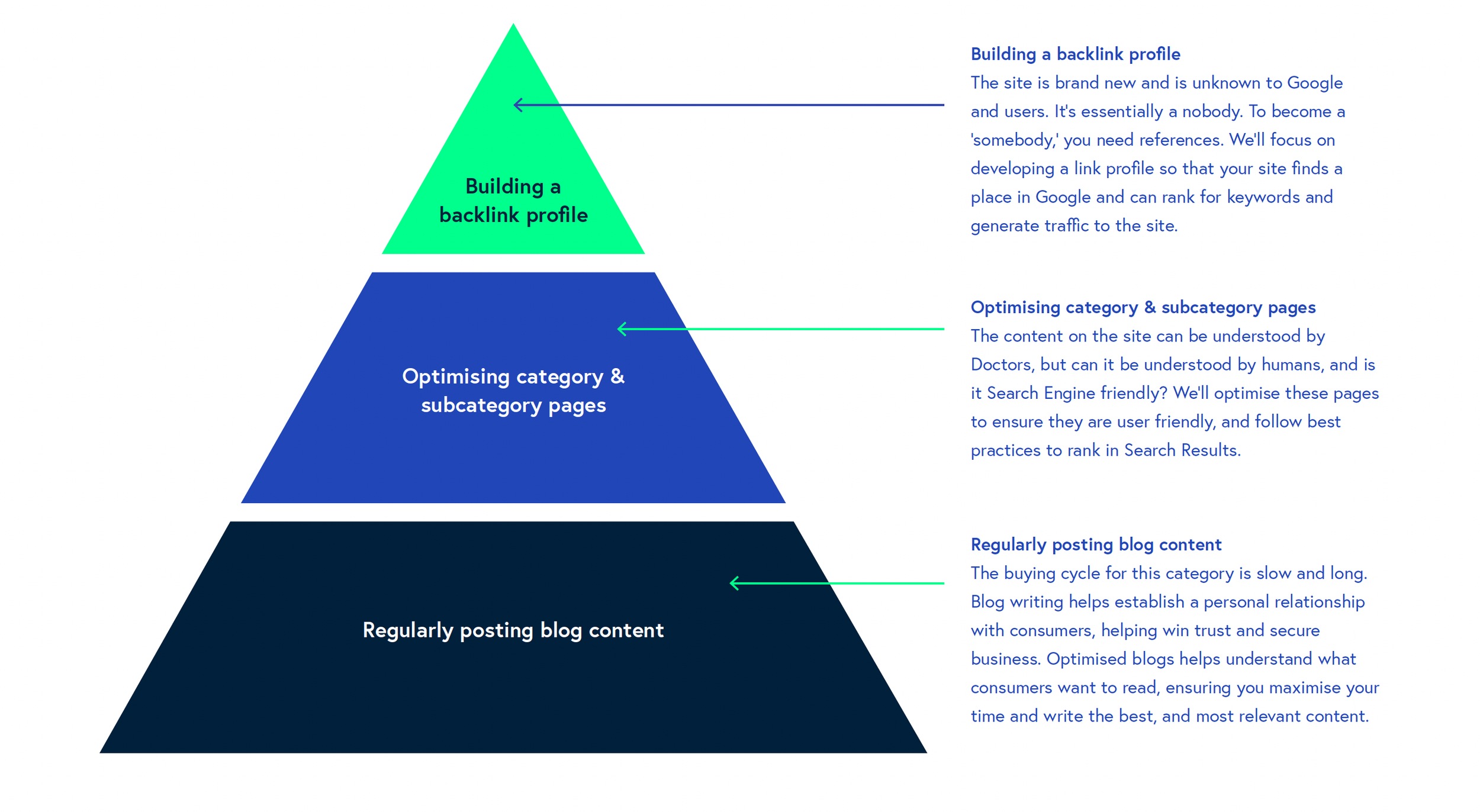If you’ve owned a website for more than 5 minutes, you’ve probably had at least 20 people approach you offering SEO services at a discounted rate.
Even as an SEO agency, our inboxes get flooded with offers all the time.
Maybe you’re tired of these offers clogging up your inbox, or maybe you’ve already set an SEO strategy but aren’t exactly sure how it is going. SEO is a pretty complex beast. There are a lot of things to understand and it can very quickly feel like information overload.
Need a bit more clarity? You’ve come to the right place.
Unfortunately though, there aren’t any quick and easy answers, so we’re going to be covering these topics more extensively in follow up blog posts. But this guide should provide a good overview of what a successful SEO strategy looks like, and hopefully make SEO slightly easier to understand if you’re feeling a little lost.
Let’s start with the basics.
What is SEO?
If you’ve ever started your own website, you’ll know how frustrating it is when you type its name into the search bar and nothing but a few random articles — or worse, your competitors — show up.
Cue SEO.
SEO stands for search engine optimisation. Put simply, SEO makes your website more visible in Google or any other search engine.
What do I mean by more visible?
(This, but the opposite.)

Search engines are sort of like libraries, but instead of books they store web pages. Being more visible means you are more likely to appear in the search engine results page (SERP) when someone types in a statement or query relevant to your brand. For example, a dentist will likely want their website to appear for searches like ‘invisalign’, ‘braces’ or ‘orthodontics’.
Search engines are sort of like libraries, but instead of books they store web pages. Being more visible means you are more likely to appear in the search engine results page (SERP) when someone types in a statement or query relevant to your brand. For example, a dentist will likely want their website to appear for searches like ‘invisalign’, ‘braces’ or ‘orthodontics’.
The problem in that example: there are a lot of dentists competing for the same set of keywords, which is true of every category. Only the best web pages are able to appear on the first page of organic search results, and in most cases, the first page is the only thing that will actually deliver any organic traffic to your website.
That’s where you want to be, but getting there without a well rounded SEO strategy is unlikely. Search engines are quite sophisticated in how they consider and rank web pages, so having a nice font and colours isn’t going to cut it.
We don’t know every one of their ranking signals, but there are known search engine guidelines that many SEO experts consider when doing search engine optimisation.
Let’s start with the basics.
The fundamentals
Let’s make this snappy: there are three fundamental principles to follow when dealing with SEO. These form the foundation of any SEO campaign, and if implemented correctly, will help you achieve SEO success.

Think code, meta tags and everything else in between.
Although there are visible elements, like meta description tags and other components involved in Technical SEO, the majority of technical aspects are mostly unseen by humans and refer to elements of your website that communicate with search engines directly.
These are the things that make it easier for search engines to add your content to their index. If your technical aspects are not set up correctly, it makes it a lot harder for search engine crawlers to discover and understand your website and its content.
Don’t get carried away though.
Technical SEO isn’t only about appeasing search engine algorithms, but also users. User experience is highly influential when determining the search engine worthiness of a website, so having a website that is both easy for search engine crawlers and users to work through is crucial to ensuring your technical SEO efforts are worthwhile.
Content
Contrary to popular belief, content from an SEO perspective is about more than just keywords and keyword rankings. Any SEO company that says you only need to think about these shouldn’t be trusted.
Keywords are simply search terms people use in search engines – they are not magical words that suddenly give you traffic. The real value is in the keyword research as it is here that business owners can get a better idea of their target audience and their behaviour on search engines.

Your objective is to use relevant keywords to write content that will add value and help you build a relationship with your customers.
It sounds simple, but it isn’t. Using keywords incorrectly by keyword stuffing and engaging in other black hat seo techniques will undermine your SEO efforts and damage your reputation with your audience and with Google. Knowing how to use keywords will help improve your content, bump your traffic up and create a positive brand reputation.
Content extends into everything on your website that can be read, seen or interacted with by a user. This includes category pages, blogs, headings, images, internal links and more. One of Google’s primary ways of assessing a page’s content is through its EAT framework— or Expertise, Authoritativeness, and Trustworthiness. Your content should reflect a high level of all of these metrics.
Link building
Links make the world go round.
(At least, in SEO they do.)
An external link is a vote of confidence; in the search engine world, it’s the equivalent of a good referral from a trusted source. Search engines will be very reluctant to recommend your website to users if you don’t have enough websites vouching for you.
Building links is one of the hardest things to do in SEO. It takes the longest amount of time and requires a lot of patience. In many ways, this is the biggest reason that SEO should not be considered a quick-wins game.
A good link is worth its weight in gold, so it’s important to spend time acquiring high quality backlinks. Acquiring low quality dirty links will only be a waste, and could result in your site being removed from search engines all together.
Don’t believe me? Check out what SEO software Ahrefs has to say about site penalties.
How does this fit together?
Combining each of these key aspects together is what allows us to form SEO campaigns that deliver favourable search results in both Google and other search engines.
Campaigns from good SEO agencies begin with an audit of your website and its existing state before any recommendations, plans or SEO work is made or completed. SEO audits usually assess how the website is performing in all fundamental aspects, including internal link structure, speed, traffic and links.
With that done, we move into recommendations based on the specific business we’re dealing with. Not every business is the same — each has its own strengths and weaknesses, so each SEO campaign and timeline should look different depending on the client. Here’s one of our most recent examples:

This is where you make or break. It’s really important to spend enough time planning during campaign set-up.
We believe that SEO work should tie into the overall marketing strategy, so we begin by working through a discovery meeting with our client and then collaboratively drafting an SEO brief. This helps us as the agency to prioritise the right goals and targets, and ensures our clients can develop realistic expectations and keep us accountable with our work.
What does SEO cost?
We aren’t going to lie to you: search engines take time to respond to, so SEO is an investment that typically takes a few months to see noticeable organic traffic. However, you get out of it what you’re willing to put in. Most agencies charge a monthly retainer based on the number of hours they work on your campaign, or they can just charge an hourly rate specifically. For quality SEO from a reputable agency, you will typically pay at least a couple thousand a month, but smaller-scale campaigns can come in cheaper depending on the scope.
When deciding on an SEO agency, there are a couple of things to avoid. Firstly, don’t choose an SEO package that is based largely or solely around the number of keywords you will rank for. Unfortunately, no one can predict what Google’s algorithm will do, and ranking for certain keywords cannot be guaranteed.
This also extends to traffic numbers and links — no one can promise that you will be able to gain these things. Essentially, if an SEO agency is promising you anything other than hard work, transparency and accountability, they might be misleading you.
Secondly, you should always qualify how your agency plans to track their work and show you results. Unfortunately, we hear a lot of SEO horror stories from brands who have had their investments taken and received nothing in return. Any agency you choose should be very transparent with their reporting, giving you regular updates on your traffic stats, keywords, and whether they have improved or decreased each month.
Why you should understand SEO
For most businesses, websites are the hub of activity: they are where users find information, connect with brands, make transactions and build loyalty. If users can’t find your website, you might be missing out on growth in all of those key areas.
SEO gives you the opportunity to make sure users can find your website. It’s not the only thing that does this — investing in paid search can generate quick wins, or promoting your site on social media. But SEO gives you an organic approach that is the most sustainable long-term. Importantly, there are a lot of tips and tricks you can implement at low to no cost!
Understanding how search engines work, and how to optimise and measure SEO, will give you more confidence to promote your website, which leads to improved brand awareness and reputation. But you also don’t have to do it all alone — if you have any questions, feel free to reach out to us. Jacques loves a good chat about anything SEO.

